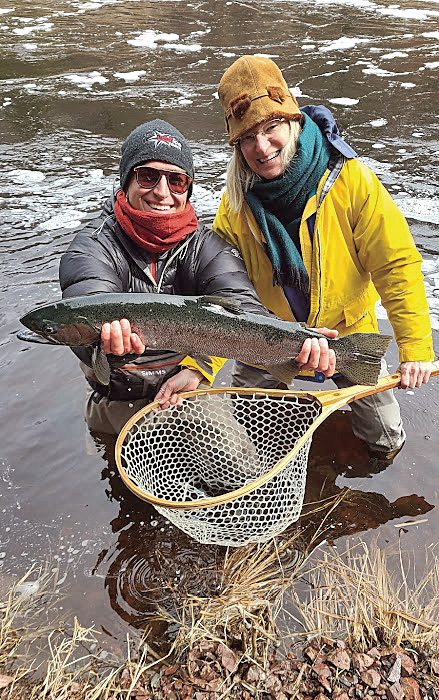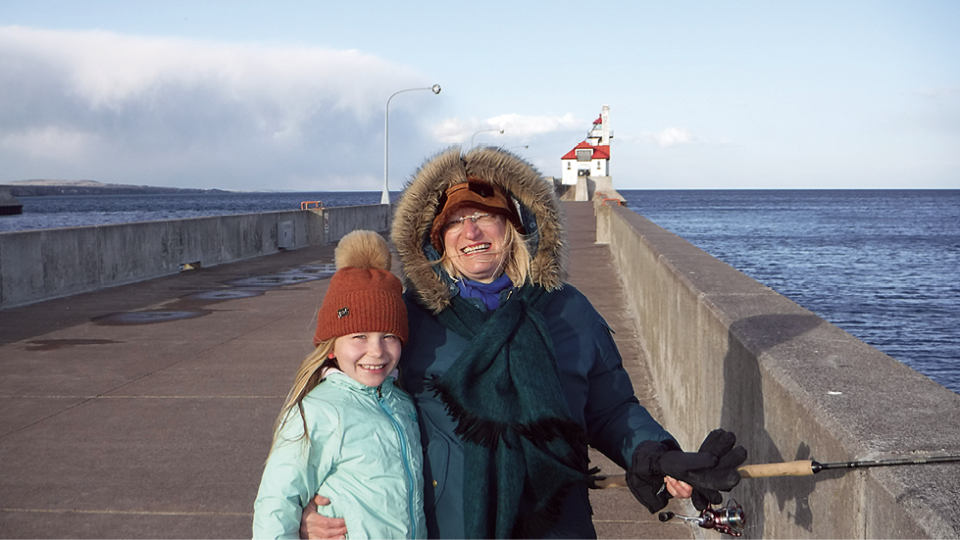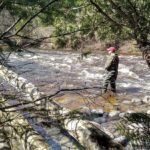My mom taught me how to fish. She and I would walk down Northwest Road to our neighborhood stream in rural western Massachusetts and fish for native brook trout. There was a culvert under the road there, with a small pool on the downstream side perfectly sized for 6-year-old casts. Simplicity was the name of the game. A couple split shot, a plain hook and a worm.
“Let it sit on bottom,” my mom would say. “Give the fish a chance. Be patient.”
Just wait. That was maybe the best lesson I learned as a kid. Good times! We occasionally caught 8-inch beauties and pan fried them for dinner. These memories remain etched in my mind forever.
Fast forward 35 years to early 2020. We invited my mom to Duluth to help us take care of our 6-month-old daughter so my wife could go back to work. My mom drove out to Minnesota for the first time and covid hit the nation just as she was heading cross-country. She arrived on Saturday, March 21 and the next Monday, my employer—a public school—went to online learning. The plan was for her to stay for three months, until my school year ended, but I ended up working from home for those next three months. Suddenly, my mom and I ended up having a lot more time together.
That spring everything was as new to us as everyone else. I wasn’t expecting to stock up on 70 percent alcohol hand sanitizer at our local distillery. I wasn’t expecting to be home with my wife and three kids, plus my mom. We took it as an opportunity though. Our favorite pastime—fishing—had now become one of only a handful of things a person was allowed to do in society. And my mom was by my side.

Together, we made trip after trip down to the pier in Duluth to fish for coho salmon. This was our covid oasis. A huge stretch of concrete, still open to the public, with ample space to spread out. Those who have walked down the pier from the Lift Bridge in April or May are well aware of the draw this place has on fisherfolk. Early spring is the time of year to target salmonids within casting distance from shore. The time when us little guys, without big and fancy motor boats, have a shot at catching our dream fish.
What a nice irony that a manmade structure meant to protect ships from heavy seas can also serve as a meeting place for generations of fisherfolk, like my mom and me. These fishing trips brought us even closer together. We would stand for hours, watching our bobbers drift up and down in the current, then shoot below the surface if a fish hit, only to surface again—harmlessly—every time we missed the hookset. It’s a slow style of fishing, very conducive to talking. You stand and watch the water, doing almost nothing but wait. That’s what we did for three months. Sometimes early mornings before work, sometimes later in the day after online teaching was over. The pier became our sanctuary—our bubble—and fishing became our defense. It was our way of protecting ourselves, physically, out in the fresh Superior breeze, and metaphorically, by practicing continuity through the hobby and traditions we both enjoy.
The big ships coming through the canal would grab our attention when fishing was slow, and my mom ended up making a classy painting of the Lift Bridge. She was expecting the cold winds whipping off the lake to be a barrier to her, but in true Duluth style she adjusted to them and accepted them. She assimilated to the challenges of early spring fishing on Lake Superior—I was proud of her.
Often times, my older daughters would accompany us and go rollerblading on the pier while we fished. Other times we brought the baby too, in her carriage. She was already a part of Duluth fishing culture before she could stand up.
We had very limited fishing success (I did catch one wild steelhead that I released), but the pier for us was about more than the fish. It was about mother-son bonding and taking a stand against the pandemic-induced closures. It was about keeping our traditions and our sanity. It was about going back in time to those walks down to our neighborhood trout stream when I was 6 years old. It was about self-care and taking care of each other. Fishing can do that for people.




